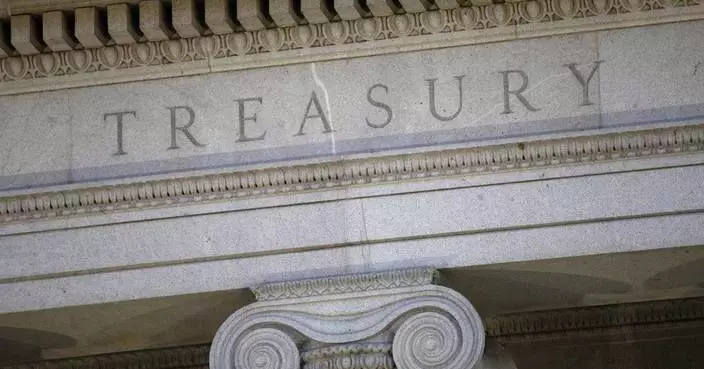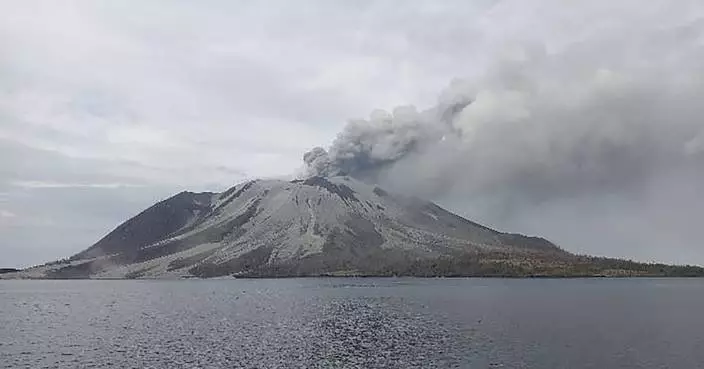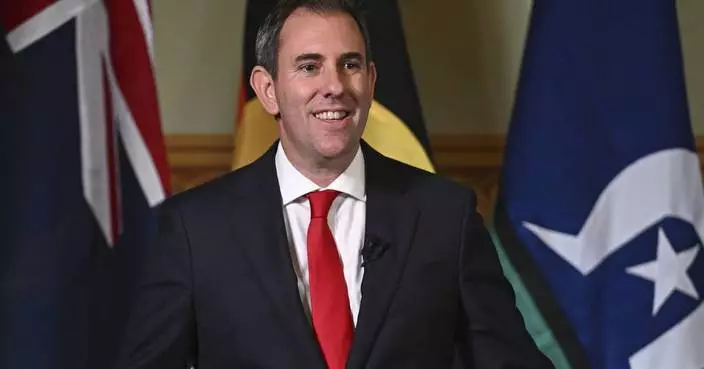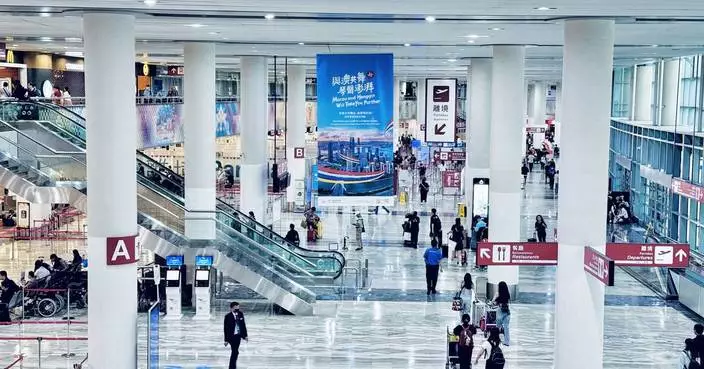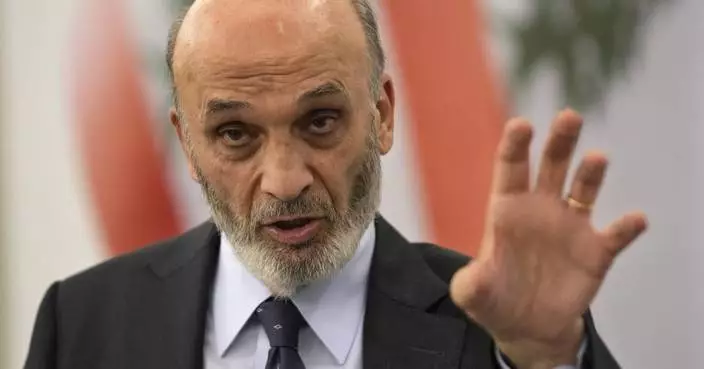Chinese President Xi Jinping on Wednesday urged a reinvigorated Communist Party to take a stronger role in society and economic development to better address the nation's "grim" challenges as he opened a twice-a-decade national congress.
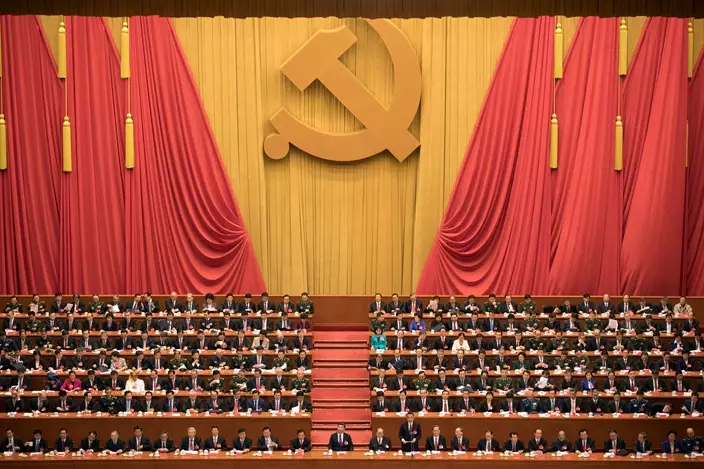
Chinese President Xi Jinping, center, presides over the opening ceremony of the 19th Party Congress held at the Great Hall of the People in Beijing Wednesday, Oct. 18, 2017. (AP Photo/Ng Han Guan)
Speaking in the massive Great Hall of the People near Tiananmen Square, Xi laid out his vision of a ruling party that serves as the vanguard for everything from defending national security to providing moral guidance to ordinary Chinese.
Click to Gallery
Chinese President Xi Jinping on Wednesday urged a reinvigorated Communist Party to take a stronger role in society and economic development to better address the nation's "grim" challenges as he opened a twice-a-decade national congress.
Speaking in the massive Great Hall of the People near Tiananmen Square, Xi laid out his vision of a ruling party that serves as the vanguard for everything from defending national security to providing moral guidance to ordinary Chinese.
Hailing the start of a "new era," Xi outlined a vision in which the party would lead China on the road to becoming a "great modern socialist country" by midcentury.
According to Xi's vision, "China would not only be a modern, socialist country but one that stands tall among the nations," Yang said. "This message he delivered with vigor."
Xi, in his three-and-a-half-hour address, said China's "prospects are bright but the challenges are grim," a rare acknowledgement of severe economic issues. He added that the party would have to take big risks and overcome "major resistance."
He struck a nationalistic line throughout his speech, calling for the party not only to safeguard China's sovereignty but also to revitalize Chinese culture, oppose "erroneous" ideology and promote religion that is "Chinese in orientation."
"The great rejuvenation of the Chinese nation is no walk in the park or mere drum-beating and gong-clanging. The whole party must be prepared to make ever more difficult and harder efforts," Xi told hundreds of delegates, mostly men in dark suits who applauded regularly as they read copies of his prepared remarks. "To achieve great dreams there must be a great struggle."
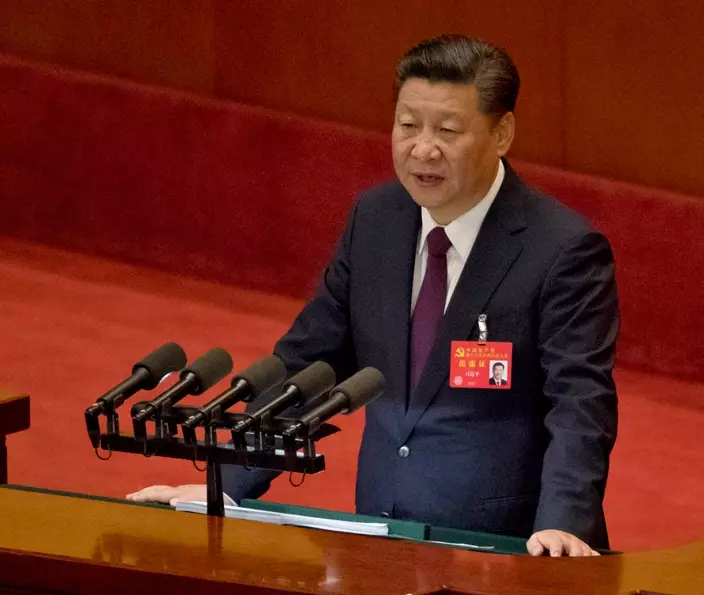
Chinese President Xi Jinping delivers a speech at the opening ceremony of the 19th Party Congress held at the Great Hall of the People in Beijing, China, Wednesday, Oct. 18, 2017. (AP Photo/Ng Han Guan)
Hailing the start of a "new era," Xi outlined a vision in which the party would lead China on the road to becoming a "great modern socialist country" by midcentury.
Xi wields undisputed power and is expected to get a second five-year term as party leader at the gathering. Analysts say he has consolidated his power by sidelining his competitors in other intra-party cliques, including those surrounding his immediate predecessor Hu Jintao and former leader Jiang Zemin.
Observers will be watching for signs of whether Xi, 64, may be looking to appoint a successor. While the nation's presidency is limited to two five-year terms, the tenure of the party's leader is bound only by tradition.
Xi has already distinguished himself from previous leaders, and is now "leading China into territory in which China is very close to achieving modest prosperity," said Dali Yang, an expert on Chinese politics at the University of Chicago.
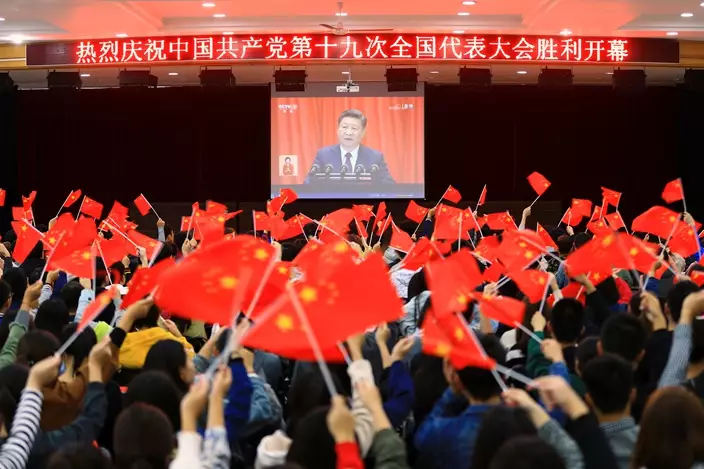
Students wave flags as they watch a speech by Chinese President Xi Jinping during the opening ceremony of China's 19th Party Congress in Huaibei in eastern China's Anhui province Wednesday, Oct. 18, 2017.(Chinatopix via AP)
According to Xi's vision, "China would not only be a modern, socialist country but one that stands tall among the nations," Yang said. "This message he delivered with vigor."
The Communist Party meetings will largely be behind closed doors and are accompanied by extraordinary security measures, such as restrictions on knife sales and greater monitoring of dissidents. But the congress will see powerful players emerge in new roles and is a chance for Xi to publicly lay out his political and economic vision over the next five years.
In emphasizing the party's supremacy over all aspects of Chinese society, Xi is "making a big pitch for the importance of party leadership and what he claims only the party can achieve," said Willy Lam, a China expert at the Chinese University of Hong Kong. "It's an appeal to ordinary Chinese to abide by the party's instructions, in particular that of the top leadership — that is, himself."
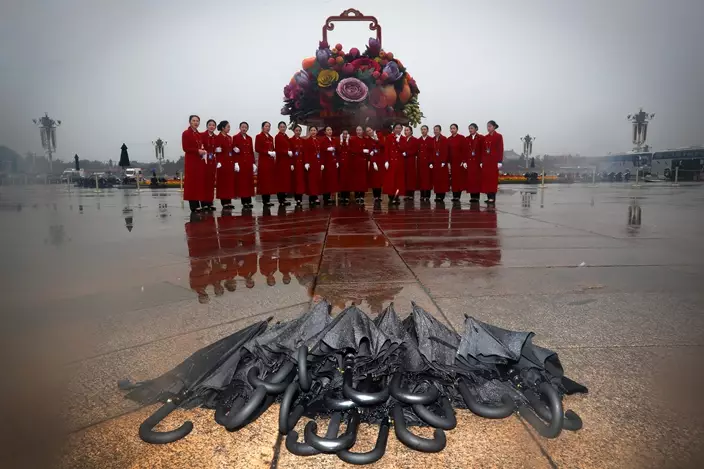
Hospitality staff pose for a photograph in the rain in front of a giant basket decorated with replicas of flowers and fruits on display on Tiananmen Square during the opening ceremony of the 19th Party Congress in Beijing, Wednesday, Oct. 18, 2017. (AP Photo/Andy Wong)
Xi, in his three-and-a-half-hour address, said China's "prospects are bright but the challenges are grim," a rare acknowledgement of severe economic issues. He added that the party would have to take big risks and overcome "major resistance."
Other Chinese leaders have regularly warned since the 2008 financial crisis that China's economic growth faces "downward pressure" due to weak global demand that threatens export industries in the world's second-largest economy. But Xi's comments were unusual in a keynote speech meant to highlight the party's confidence and long-range vision.
Among the grave issues Xi said were insufficiently addressed are a widening income gap and problems in employment, education, medical care and other areas.
He pledged to make high school universally available and promised to extend land-use contracts for farmers for another 30 years after expiration.
Xi hailed China's island-building efforts in the disputed South China Sea as well as his signature foreign-policy initiative, the "One Belt, One Road" infrastructure investment project aimed at improving connections between China, Europe and Africa.
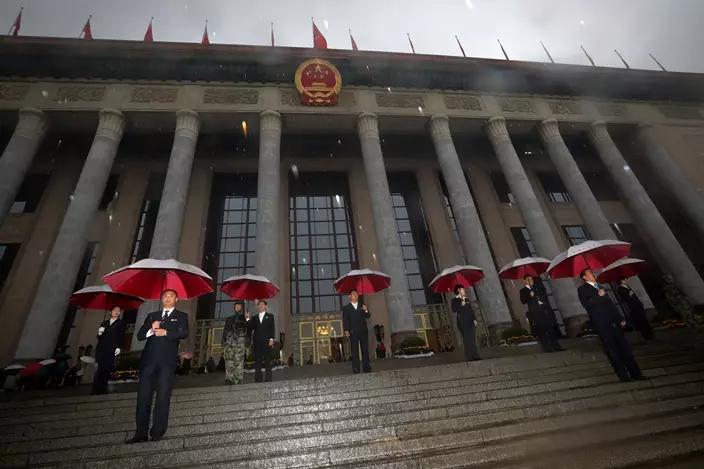
Security officers hold umbrellas in the rain outside the Great Hall of the People as they wait for delegates arrive for the opening ceremony of the 19th Party Congress at the Great Hall of the People in Beijing, Wednesday, Oct. 18, 2017. (AP Photo/Andy Wong)
He also praised the party's tightened grip over domestic security, saying that social stability had been maintained and national security strengthened.
To achieve a "moderately well-off society" by 2021 — the 100th anniversary of the party's founding — and even greater national power and prosperity by 2049 — the centenary of the founding of the Communist state — China needs continued economic growth and the lifting of millions out of poverty. The country is also rapidly expanding its military and political power, including its growing ability to dominate the Asia-Pacific region.
Xi affirmed economic plans that call for developing state-owned companies that dominate industries including finance, energy and telecoms while also giving the market the "decisive role" in allocating resources.
The party declared for the first time in 2013 that it would give market forces the "decisive role," a step business groups welcomed as a commitment to freer markets. But the same declaration also said the party would play a bigger role in managing state industry, which could blunt the impact of competitive forces.
Xi emphasized Beijing "must develop the public sector," a goal that reform advocates complain wastes public money and further slows economic growth.
Xi also confirmed official pledges to make the banking industry more market-oriented and to shrink bloated state-owned steel and coal industries.
Excess industrial capacity has strained trade relations with Washington and Europe, which complain that a flood of low-cost Chinese exports is depressing global prices for steel, aluminum and other goods and threatening jobs abroad.
Xi pledged that the party would have "zero tolerance" for corruption and exhorted members to resist "pleasure seeking, inaction, sloth and problem avoidance."
The most tangible results of the congress will likely be personnel appointments.
China is run by the party's Politburo Standing Committee, currently a seven-member body led by Xi, with Premier Li Keqiang his No. 2. While Xi and Li are expected to stay, the fates of others are determined by loose precedents governing retirement age. Four are expected to depart, while the status of party discipline boss and close Xi ally Wang Qishan appears uncertain.
In a secret process, the congress delegates will select a roughly 200-member central committee, along with more than 150 alternates, from a pool of around 400 candidates. The committee will then pick a 25-member politburo and the elite Politburo Standing Committee, led by the general secretary. The makeup of the top body will only be known at the close of the meeting when its members reveal themselves on stage in front of journalists, according to past practice.
PHOENIX (AP) — The Arizona Legislature approved a repeal of a long-dormant ban on nearly all abortions Wednesday, sending the bill to Democratic Gov. Katie Hobbs, who is expected to sign it.
Two Republicans joined with Democrats in the Senate on the 16-14 vote in favor of repealing a Civil War-era ban on abortions that the state’s highest court recently allowed to take effect. The ban on all abortions — which provides no exceptions for survivors of rape or incest, and only allows for procedures done to save a patient’s life — would still be active until the fall.
Hobbs said in a statement that she looks forward to quickly signing the repeal, with a ceremony scheduled for Thursday.
“Arizona women should not have to live in a state where politicians make decisions that should be between a woman and her doctor,” Hobbs said. "While this repeal is essential for protecting women’s lives, it is just the beginning of our fight to protect reproductive healthcare.”
The revival of the 19th century law has put Republicans on the defensive in Arizona, one of a handful of battleground states that will decide the next president.
“Across the country, women are living in a state of chaos and cruelty caused by Donald Trump,” Vice President Kamala Harris said in a statement on Wednesday. “While Arizona Democrats have worked to clean up the devastating mess created by Trump and his extremist allies, the state’s existing ban, with no exception for rape or incest, remains in effect.”
If the repeal bill is signed, a 2022 statute banning the procedure after 15 weeks of pregnancy would become Arizona’s prevailing abortion law. Still, there would likely be a period when nearly all abortions would be outlawed, because the repeal won’t take effect until 90 days after the end of the legislative session, likely in June or July.
Within hours after the vote, efforts were already under way to prevent the older abortion ban from taking effect before the repeal becomes a reality.
“Without an emergency clause that would allow the repeal to take effect immediately, the people of Arizona may still be subjected to the near-total abortion ban for a period of time this year,” Arizona state Attorney General Kris Mayes said. “Rest assured, my office is exploring every option available to prevent this outrageous 160-year-old law from ever taking effect.”
Planned Parenthood Arizona announced it filed a motion Wednesday afternoon asking the state Supreme Court to prevent a pause in abortion services until the Legislature’s repeal takes effect.
The near-total ban on abortions predates Arizona’s statehood. In a ruling last month, the Arizona Supreme Court suggested doctors could be prosecuted under the 1864 law, which says that anyone who assists in an abortion can be sentenced to two to five years in prison. Then, last week, the repeal bill narrowly cleared the Arizona House.
Voting on the bill stretched more than an hour on Wednesday, amid impassioned speeches.
“This is about the Civil War-era ban that criminalizes doctors and makes virtually all abortions illegal,” said Democratic state Sen. Eva Burch. "We’re here to repeal a bad law. I don’t want us honoring laws about women written during a time when women were forbidden from voting because their voices were considered inferior to men.”
Burch made public on the Senate floor in March that she had a non-viable pregnancy and was going to have an abortion. She warned supporters of reproductive rights on Wednesday that they could not yet rest easy, even after the repeal is signed.
“They are going to use every tool in the toolbox to try to do whatever it is they can to interfere with the repeal of this ban," she said.
There were numerous disruptions from people in Senate gallery, as Republican state Sen. Shawnna Bolick explained her vote in favor of repeal, joining with Democrats.
Bolick appeared to argue that a repeal would guard against extreme ballot initiatives from abortion rights advocates. She is married to state Supreme Court Justice Clint Bolick, who voted to allow a 1864 law on abortion to be enforced again.
“I want to protect our state constitution from unlimited abortions,” the senator said. “I am here to protect more babies. I vote aye.”
Advocates on both sides of the abortion issue flocked to the Arizona Senate to vocalize their views.
A school-age girl kneeled in prayer in front of a statue of the Virgin Mary, while a man with a megaphone shouted at passersby to repent.
Former President Donald Trump, who has warned that the issue could lead to Republican losses, has avoided endorsing a national abortion ban but said he’s proud to have appointed the Supreme Court justices who allowed states to outlaw it.
The Arizona law had been blocked since the U.S. Supreme Court’s 1973 Roe v. Wade decision guaranteed the constitutional right to an abortion nationwide.
When Roe v. Wade was overturned in June 2022 though, then-Arizona Attorney General Mark Brnovich, a Republican, persuaded a state judge that the 1864 ban could again be enforced. Still, the law hasn’t actually been enforced while the case was making its way through the courts. Mayes, who succeeded Brnovich, urged the state’s high court against reviving the law.
Planned Parenthood officials have said they will reinforce networks that help patients travel out of state to access abortion in places like New Mexico and California.
Advocates are collecting signatures for a ballot measure allowing abortions until a fetus could survive outside the womb, typically around 24 weeks, with exceptions — to save the parent’s life, or to protect her physical or mental health.
Republican lawmakers, in turn, are considering putting one or more competing abortion proposals on the November ballot.

Arizona state senator Shawnna Bolick, R-District 2, speaks, Wednesday, May 1, 2024, at the Capitol in Phoenix. (AP Photo/Matt York)

Anti-abortion supporters stand outside the Capitol, Wednesday, May 1, 2024, in Phoenix. (AP Photo/Matt York)

Democratic Arizona state senator Anna Hernandez, D-District 24, left, hugs a colleague after a their vote, Wednesday, May 1, 2024, at the Capitol in Phoenix. Democrats secured enough votes in the Arizona Senate to repeal a Civil War-era ban on abortions that the state's highest court recently allowed to take effect. (AP Photo/Matt York)

Arizona state senator Jake Hoffman, R-District 15, speaks Wednesday, May 1, 2024, at the Capitol in Phoenix. Democrats secured enough votes in the Arizona Senate to repeal a Civil War-era ban on abortions that the state's highest court recently allowed to take effect. (AP Photo/Matt York)

Democratic Arizona state senators hug after a their vote, Wednesday, May 1, 2024, at the Capitol in Phoenix. (AP Photo/Matt York)
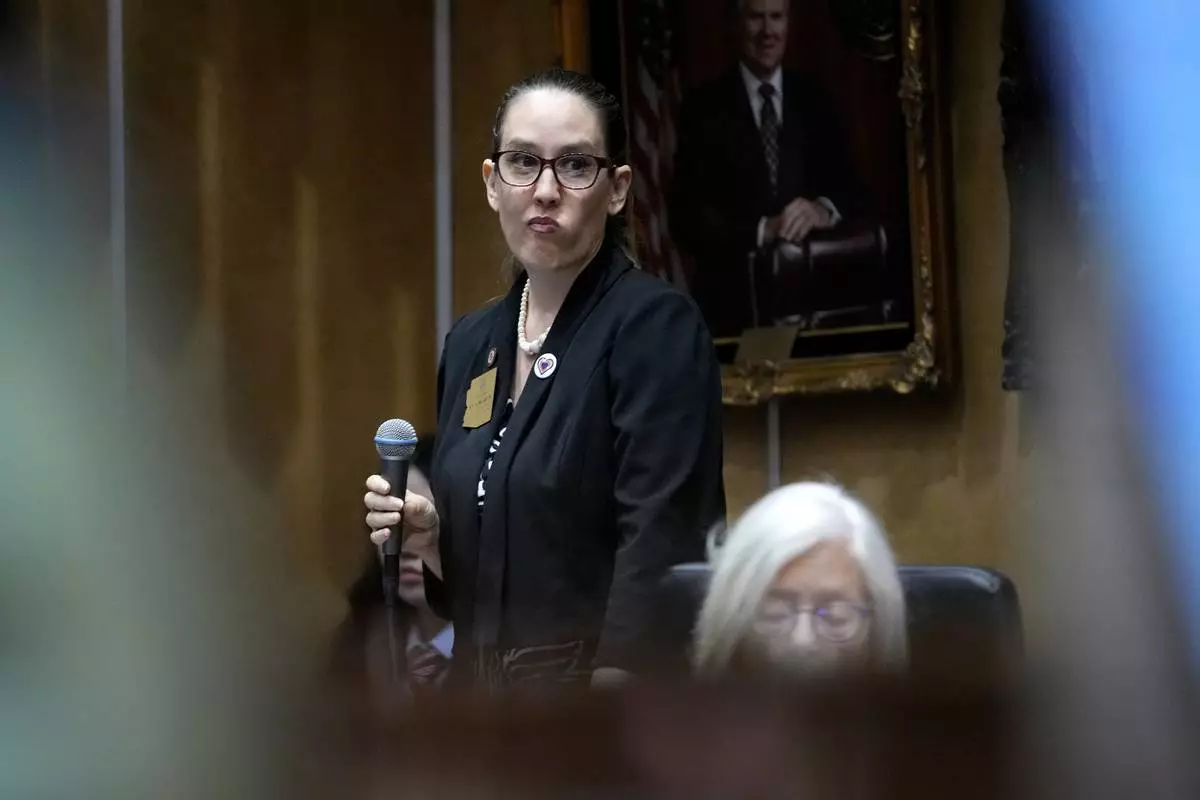
Arizona state senator Eva Burch, D-District 9, looks on, Wednesday, May 1, 2024, at the Capitol in Phoenix. (AP Photo/Matt York)

Arizona state senator J. D. Mesnard, R-District 13, plays audio of a heart beat from his cell phone, Wednesday, May 1, 2024, at the Capitol in Phoenix. (AP Photo/Matt York)

Arizona state senator Shawnna Bolick, R-District 2, speaks, Wednesday, May 1, 2024, at the Capitol in Phoenix. (AP Photo/Matt York)
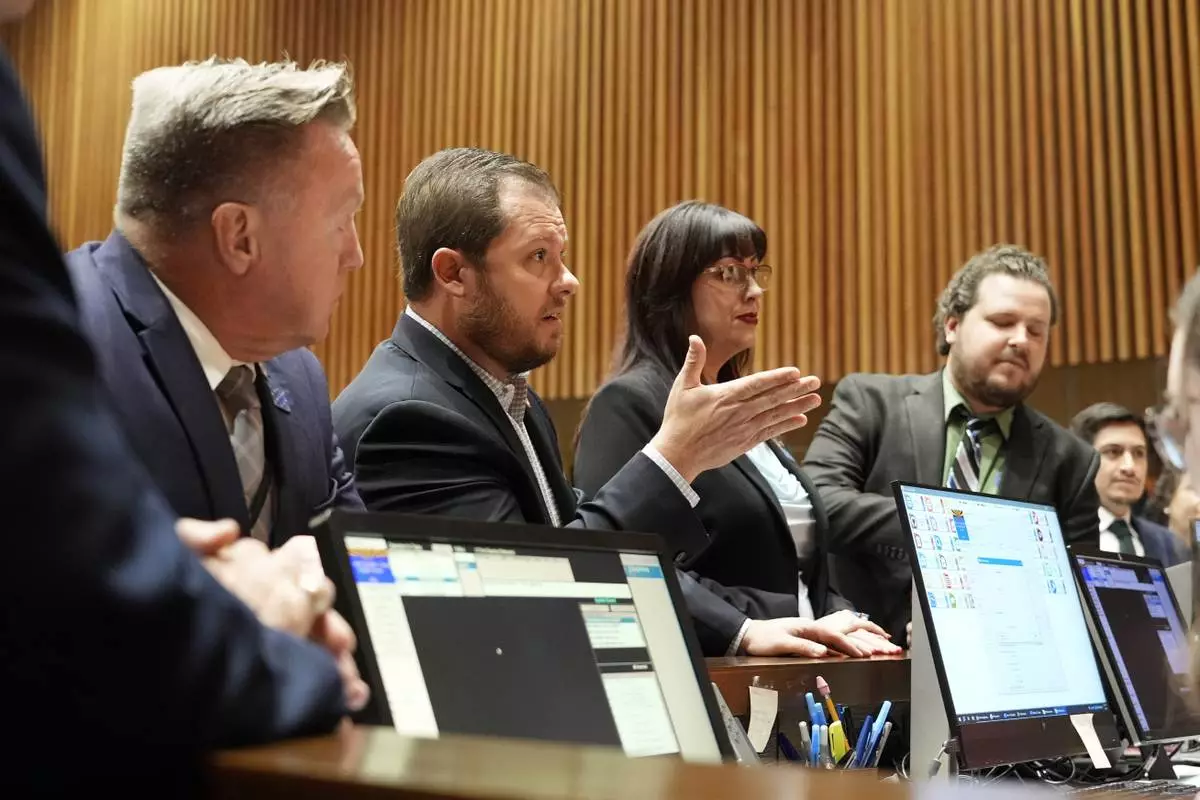
Arizona state senator Jake Hoffman, R-District 15, motions as he speaks to the Senate President, Wednesday, May 1, 2024, at the Capitol in Phoenix. (AP Photo/Matt York)

FILE - The Arizona Senate building at the state Capitol stands, April 11, 2024, in Phoenix. Democrats at the Arizona Legislature are expected to make a final push Wednesday, May 1, to repeal the state’s long-dormant ban on nearly all abortions that a court said can be enforced. (AP Photo/Ross D. Franklin, File)

FILE - Pro-life demonstrators walk in the front of the Arizona Capitol prior to the vote on the proposed repeal of the state's near-total ban on abortions prior to winning approval from the state House on, April 24, 2024, in Phoenix. Democrats at the Arizona Legislature are expected to make a final push Wednesday, May 1, to repeal the state’s long-dormant ban on nearly all abortions that a court said can be enforced. (AP Photo/Ross D. Franklin, File)



















